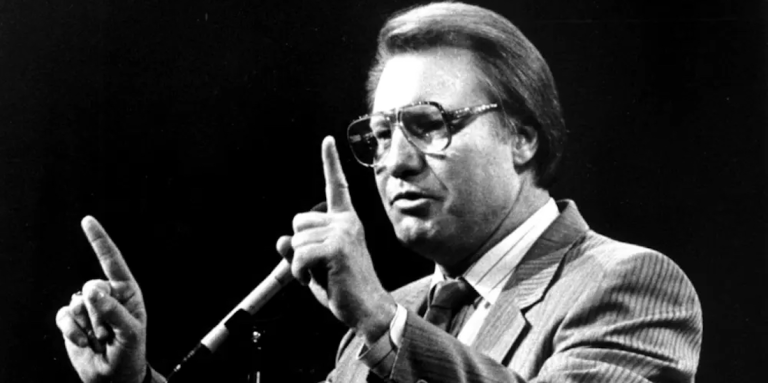
Swaggart’s rise, scandals, and influence shaped U.S. religious politics and culture for decades
New York, N.Y. – Jimmy Swaggart’s journey from rural Louisiana to the global stage is a story of ambition, charisma, and controversy.
Born in 1935, Jimmy Swaggart “poured out his life preaching the gospel, singing songs of the faith, and pointing millions to the saving power of Jesus Christ and the Baptism of the Holy Spirit,” his family said in a statement after his death at age 90.
By the mid-1980s, his Sunday broadcasts were shown on numerous television stations throughout the United States, reaching millions and making him one of the most recognizable faces in American religious life.

Early Stardom and the Birth of a Media Empire
Swaggart’s ministry was built on a blend of fiery sermons, gospel music, and a mastery of television. “His voice echoed through nations, his music softened hearts, and his message never changed: Jesus Christ and Him crucified,” his family wrote.
At its peak, his organization was estimated to rake in more than
$140 million a year, and his influence extended far beyond the pulpit.
Scandal and the Fall from Grace
But Swaggart’s career was forever altered by scandal. In 1988, he delivered a tearful, nationally televised confession: “I have sinned against you. I beg you to forgive me.” The admission came after he was photographed with a local sex worker, a revelation that “caused an immediate media earthquake” and led to his suspension and eventual defrocking by the Assemblies of God. Swaggart refused to step away from the pulpit, breaking away from the denomination to establish an independent ministry.
The fallout was swift and severe. Television networks dropped his broadcasts, donations and church attendance plummeted, and his Bible college lost students and accreditation. Swaggart’s reputation became a national punchline, and his name was invoked as a symbol of religious hypocrisy.
In a July 2, 2025 Opinion Piece (link), MSNBC columnist Anthea Butler entitled “We can blame Jimmy Swaggart for much of our toxic politics.” She goes on to say, “Swaggart’s mix of old-time gospel, his interpretations of biblical prophecy and his evangelistic crusades spread a particular kind of fundamentalist Pentecostalism that endures today.”
How one man became the
architect of hate from the pulpit
Shaping the Religious Right and Political Influence
Swaggart’s impact, however, extended beyond his personal failings. As MSNBC’s opinion piece notes, he was “a forerunner of the staunch religious figures who now sway the Republican Party with their expressions of animosity cloaked in Christian righteousness.”
Swaggart’s rhetoric in the 1970s and ‘80s played a pivotal role in the emergence of the religious right in America, aligning closely with President Ronald Reagan and helping to shape the political landscape for decades.
He was known for his vehement denunciations of LGBTQ individuals
and adherents of other faiths, particularly Catholics and Jews.
In 1986, he published a book articulating his view that Catholics were not true Christians, and his sermons often included apocalyptic conspiracies and contempt for those outside his brand of Pentecostal fundamentalism.
Legacy: A Changed Landscape for U.S. Religion
Swaggart’s downfall marked a turning point for Christian moral authority in public life. As one commentator observed, “Swaggart’s scandal produced swift and devastating consequences… The ripples of scandal continued to move outwards: Television networks dropped his broadcasts, donations and church attendance plummeted, his Bible college lost students and accreditation, and his reputation became a national punchline.”
Yet, Swaggart never fully disappeared. He continued preaching from his Family Worship Center in Baton Rouge, and his SonLife Broadcasting Network remains on the air. His son Donnie and grandson Gabriel have taken up the family vocation, ensuring that the Swaggart name endures in American religious life.
The End of an Era
Swaggart’s death closes a chapter in the history of American televangelism. His life was a study in contrasts: a gifted preacher and musician whose message reached millions, but whose personal failings and divisive rhetoric left a complicated legacy.
As his family wrote, “Today, our hearts are heavy as we share that Brother Swaggart has finished his earthly race and entered into the presence of His Savior, Jesus Christ. Today was the day he had sung about for decades.”
His story is a reminder of the power—and peril—of religious celebrity in the U.S., and the enduring influence of those who shape the nation’s spiritual and political life.